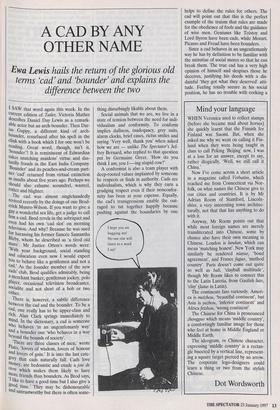Mind your language
WHEN Veronica used to collect stamps (before she became mad about horses) she quickly learnt that the Finnish for Finland was Suomi. But, when she asked me why we went on calling it Fin- land when they were being taught in class to call Peking 'Beijing' now, I was at a loss for an answer, except to say, rather illogically, 'Well, we still call it China.'
Now I've come across a short article in a magazine called Verbatim, which reached me from Connecticut via Nor- folk, on what names the Chinese give to our cities and countries. It is by Mr Adrian Room of Stamford, Lincoln- shire, a very interesting town architec- turally, not that that has anything to do with it.
Anyway, Mr Room points out that while most foreign names are merely transliterated into Chinese, some by chance also have their own meaning in Chinese. London is lundun, which can mean 'matching honest'. New York may similarly be rendered niuyue, 'bond agreement', and France faguo, 'method country'. Paris doesn't come out quite so well as bali, 'clayball multitude', though Mr Room likes to connect this to the Latin Lutetia, from Gaulish Into, `clay' (lutus in Latin).
The continents fare variously. Ameri- ca is meizhou, 'beautiful continent', but Asia is yazhou, 'inferior continent' and Africa feizhou, 'wrong continent'.
The Chinese for China is pronounced zhongguo which means 'middle country', a comfortingly familiar image for those who feel at home in Middle England or Middle Earth.
The ideogram, or Chinese character, expressing 'middle country' is a rectan- gle bisected by a vertical line, represent- ing a square target pierced by an arrow. The corporate logo-designers could learn a thing or two from the stylish Chinese.
Dot Wordsworth


































































 Previous page
Previous page